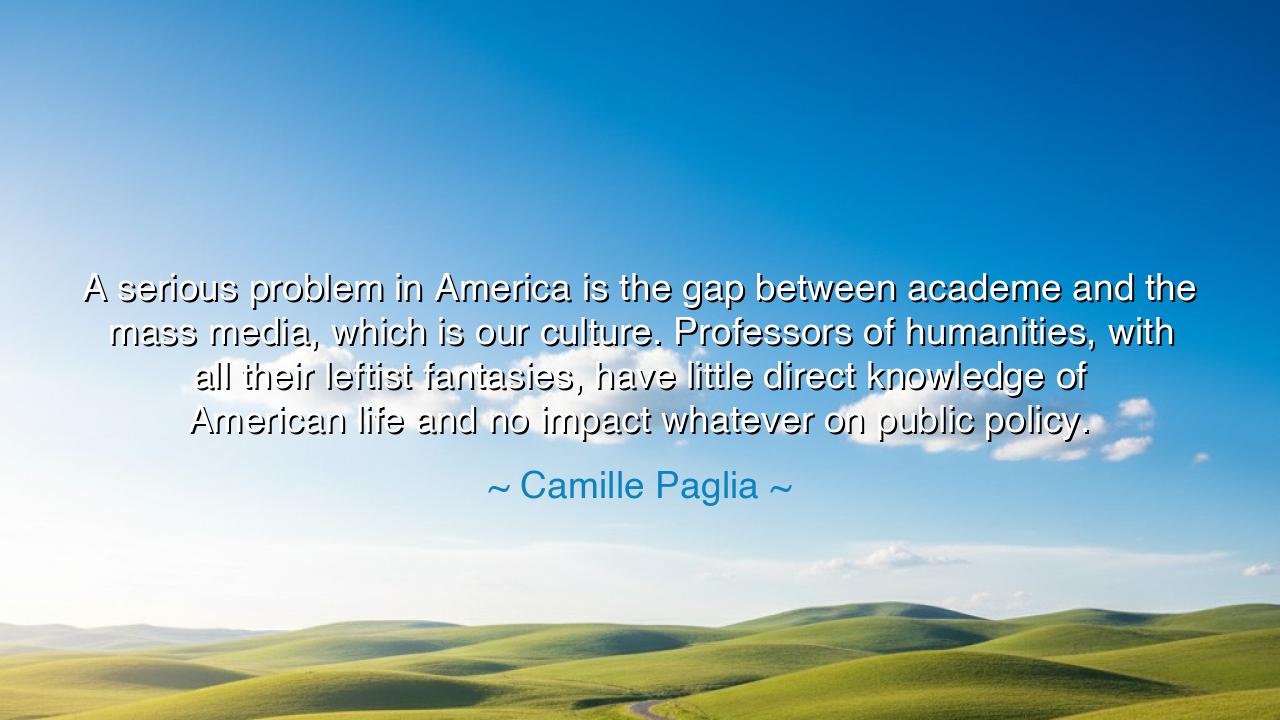
A serious problem in America is the gap between academe and the
A serious problem in America is the gap between academe and the mass media, which is our culture. Professors of humanities, with all their leftist fantasies, have little direct knowledge of American life and no impact whatever on public policy.






The scholar and cultural critic Camille Paglia, whose voice has long thundered across the realms of art, philosophy, and politics, once declared with fearless clarity: “A serious problem in America is the gap between academe and the mass media, which is our culture. Professors of humanities, with all their leftist fantasies, have little direct knowledge of American life and no impact whatever on public policy.” In these words lies both a lament and a challenge—a call to awaken the guardians of thought from their self-made towers, and to remind them that knowledge divorced from life is a shadow of wisdom. Paglia, in her fierce and prophetic style, points to a widening chasm between the thinkers and the people, between those who study culture and those who create and live it.
The origin of this quote comes from Paglia’s long-standing critique of modern academia and her defense of popular culture as the living pulse of civilization. Born in an age when universities became increasingly insulated from the real world, she saw the once-vibrant fields of philosophy, literature, and art lose their fire. Professors, she said, turned inward, feeding on jargon and ideology while the mass media—film, television, music, and now digital platforms—became the true arena of cultural power. The classroom, once a forge of moral and artistic imagination, had grown sterile; the screen had become the new agora. Paglia’s words carry the sting of truth: that intellectuals, if they refuse to speak to the people, will be forgotten by them.
Throughout history, the vitality of a civilization has depended on its ability to unite thought and experience. In ancient Athens, the philosophers did not hide from the public—they walked the streets and spoke in the marketplace. Socrates, that eternal gadfly, lived among the people, asking questions that stirred both slaves and senators. His wisdom was not buried in scrolls but carried in conversation, alive and dangerous. In contrast, Paglia sees in modern academia a retreat from such engagement. The professors of the humanities, she says, dream lofty dreams of revolution and progress, but their voices no longer reach the hearts of the citizens whose lives they claim to champion. The gap between academe and culture is not merely an intellectual divide—it is a wound in the soul of the nation.
This rift is most visible in America’s worship of the mass media, which, for better or worse, has become the true shaper of minds and morals. The poet and the playwright once guided society’s conscience; now it is the journalist, the entertainer, the influencer who wields the pen that moves nations. Paglia does not condemn this outright—she understands that the media are the new theater of human expression—but she laments that the scholars, who should illuminate this arena, stand aloof, sneering instead of contributing. They are critics without courage, thinkers without relevance. Thus, the culture of the people evolves without the guidance of its supposed intellectual shepherds, and society drifts, unanchored from reflection.
Paglia’s words also carry within them an accusation of arrogance. When knowledge becomes a fortress rather than a bridge, it ceases to serve its purpose. The intellectual who refuses to understand American life, who speaks only to his peers in riddles of theory, betrays the calling of the mind. True wisdom must breathe the air of the world—it must listen to the farmer, the worker, the artist, the soldier. To understand a nation, one must walk its streets, hear its music, feel its pain. Knowledge that hides in classrooms becomes sterile; knowledge that walks among the people becomes divine.
Consider the example of Jane Addams, the founder of Hull House in Chicago. Though highly educated, she refused to live apart from the people she sought to uplift. She built schools, organized workers, and listened to immigrants tell their stories. Through her, knowledge took root in the soil of experience, and from that union came social reform that transformed the nation. Addams lived the opposite of what Paglia condemned—she was the scholar who became servant, the thinker who acted, the intellectual who loved humanity enough to share its burdens. Her life proves that when the mind descends from its tower, the world itself rises.
O listener, take this truth into your heart: wisdom must walk hand in hand with life. Seek not to be learned only in books, but in the beating heart of your people. Do not allow your intellect to drift into abstraction, nor your education to become a shield from the world. To study the humanities is to study humanity itself—and humanity lives not in papers and lectures, but in laughter, struggle, and song. If knowledge does not touch the living pulse of the people, it is not knowledge but vanity.
Thus, the lesson of Camille Paglia endures for every generation: that thought and






AAdministratorAdministrator
Welcome, honored guests. Please leave a comment, we will respond soon